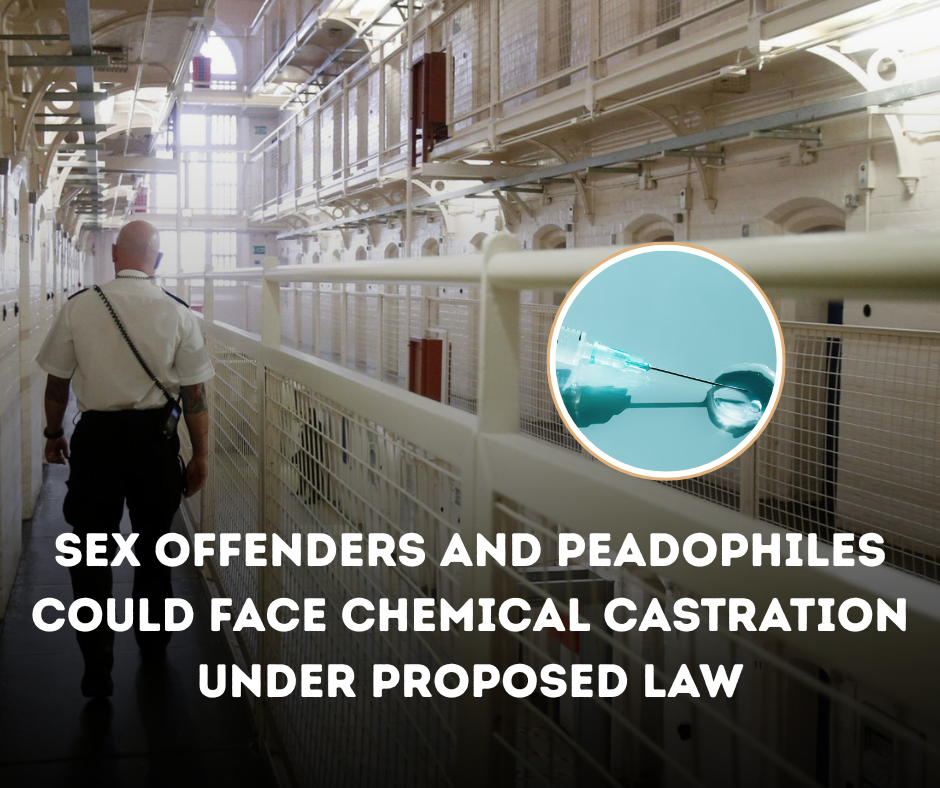The UK government is considering a controversial but potentially far-reaching proposal: the mandatory use of chemical castration for certain high-risk sex offenders, including paedophiles, in England and Wales. The measure is part of a broader strategy to reduce reoffending, manage prison populations, and enhance public safety.
Justice Secretary Shabana Mahmood is currently reviewing the recommendations of an independent sentencing review led by former Justice Secretary David Gauke. The report suggests that some sex criminals, particularly repeat offenders and those convicted of the most serious crimes, could face compulsory chemical treatments designed to reduce sexual urges.
Chemical castration, in this context, involves the use of drugs—primarily selective serotonin reuptake inhibitors (SSRIs) and anti-androgen medications—that lower testosterone levels and suppress libido. These treatments, when combined with psychiatric support, have shown promising results in reducing compulsive sexual behaviors and significantly lowering the risk of reoffending.
Until now, such treatments in the UK have been voluntary, offered only to offenders who consent to undergo them as part of their rehabilitation. However, the new proposals include the possibility of mandating chemical castration in select cases, especially for those who pose a continuing threat to the public.
The suggested changes come at a time when the UK prison system is under enormous pressure. Overcrowding, staff shortages, and high reoffending rates have led to calls for bold reform. According to the review, expanding medical intervention could be part of a comprehensive approach to managing dangerous individuals while reducing the burden on the prison system.
The government is planning a pilot program in up to 20 prisons across England and Wales to test the effectiveness of mandatory chemical castration as part of offender management. If successful, the program could be expanded nationwide in the coming years.
In addition to this proposal, the government is weighing other significant reforms. These include replacing short prison sentences (those under 12 months) with tougher community-based punishments, enhancing electronic monitoring for released offenders, and providing more intensive supervision and rehabilitation services. The ultimate goal is to reduce the prison population by nearly 10,000 by the year 2028 while still protecting communities and ensuring justice.
Supporters of the chemical castration proposal argue that it is a humane, non-invasive way to prevent further harm, especially in cases where the offender’s behavior is driven by uncontrollable compulsions. They believe that combining medication with therapy can help break the cycle of abuse.
However, critics warn that mandatory medical treatment raises serious ethical questions. Some human rights groups and legal experts are concerned about forcing individuals to undergo hormonal treatment, even if they are convicted criminals. Others question whether the long-term effectiveness of chemical castration has been adequately studied, especially in cases where treatment stops and normal hormone levels resume.
Still, public sentiment is increasingly in favor of strong, decisive action against sexual predators. Many citizens have expressed frustration at repeat offenders being released and reoffending, sometimes with devastating consequences. The idea of reducing their ability to commit such crimes through medical means is seen by some as a necessary step in protecting the vulnerable—especially children.
Justice Secretary Mahmood is expected to release a formal response to the recommendations in the coming weeks. If the proposals are adopted, England and Wales could become among the first regions in Europe to mandate chemical castration as part of a structured criminal justice policy, marking a historic shift in how the legal system deals with some of society’s most dangerous offenders.
As the debate continues, one thing is clear: the government is under mounting pressure to deliver real solutions to the longstanding problems of crime, punishment, and prevention. Whether or not chemical castration becomes a key part of that solution remains to be seen—but the conversation has already begun.

Leave a Reply